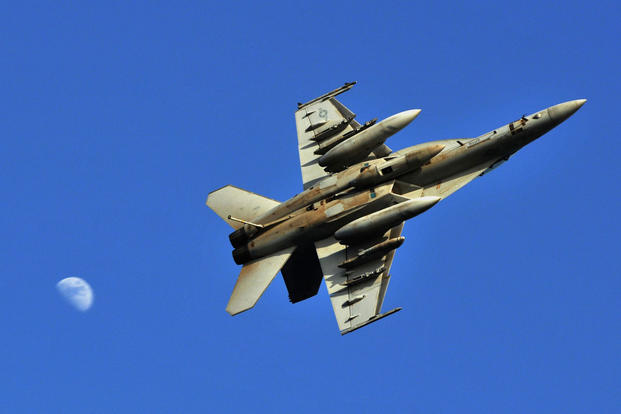[Breaking news update, posted at 9:45 a.m. ET]
U.S. warplanes early Friday morning began targeted airstrikes against Islamic militants in northern Iraq, hours after President Obama authorized the action, a Pentagon official said.
Two F/A-18 fighter jets around 6:45 a.m. dropped 500-pound laser-guided bombs on a mobile artillery piece near Erbil being used by the Islamic State of Iraq and the Levant, according to Pentagon Press Secretary John Kirby.
"ISIL was using this artillery to shell Kurdish forces defending Erbil where U.S. personnel are located," Kirby said in a statement.
"The decision to strike was made by the U.S. Central Command commander under authorization granted him by the commander in chief," he added. "As the president made clear, the United States military will continue to take direct action against ISIL when they threaten our personnel and facilities."
The jets were reportedly flying from the aircraft carrier USS George HW Bush.
[Earlier version]
President Obama late Thursday authorized airstrikes against Islamic militants in northern Iraq to stop their advance on the Kurdish capital of Irbil that threatens American personnel in the area.
“When the lives of Americans are at risk, we will take action,” Obama said in an announcement from the White House State Dining Room. He said he was authorizing “targeted airstrikes, if necessary, to protect our personnel.”
The U.S. has consulate officials and Special Operations forces stationed at a Joint Operations Center in Irbil. The president also said he approved military strikes to help Iraqi forces protect civilians trapped in mountains from radical Islamic fighters.
Bombing runs had yet to begin, but Air Force cargo planes, escorted by fighters and radar jamming aircraft, launched the first in what was expected to be a series of airdrops of relief supplies to Christians and members of the Yazidi ethnic minority fleeing northern towns taken over by the fighters of the Islamic State of Iraq and the Levant.
A senior Pentagon official, speaking on background, said C-130 and C-17 aircraft airdropped “critical meals and water for thousands of Iraqi citizens threatened by ISIL near Sinjar” and then safely exited the airspace.
In his announcement, Obama stressed that the airdrops and the possibility of airstrikes were not precursors to a wider war. “I will not allow the U.S. to be dragged into another war in Iraq,” the president said, ruling out the use of ground forces in the conflict.
Following morning meetings with senior Defense and State Department officials, White House Press Secretary Josh Earnest earlier in the day repeated the administration's previous stance that the Iraqis must first form a unity government before the U.S. would intervene militarily.
Earnest said that the crisis in northern Iraq, where the extremists were making gains against Kurdish forces, was "a particularly acute one" in which "innocent populations were persecuted just because of their ethnic identity."
The reference was to about 15,000 Yazidis, who are scorned by the militants as "devil worshippers." They fled to a mountaintop near the town of Sinjar, which was overrun by ISIL fighters.
However, Earnest said of the Iraqis that "We can't solve these problems for them. These problems can only be solved with Iraqi political solutions."
Earnest said "any sort of military action that would be taken in Iraq would be very limited in scope and very specific to addressing a core American objective."
As Earnest spoke, Iraqi-American protesters gathered outside the White House waving banners that said "U.S. We Need Your Help."
Earlier, CNN reported a U.S. official as saying that airstrikes were a possibility the Obama administration "has been talking about for some time and the latest news just might meet the threshold for action."
For weeks, the Kurdish Regional Government (KRG) in northern Iraq has pleaded for U.S. airstrikes and arms to back up its overstretched "Peshmerga" forces in holding off ISIL. (Peshmerga loosely translated means "those who are prepared to die.")
On Thursday, KRG Prime Minister Nechirvan Barzani urged residents not to panic as ISIL fighters reportedly advanced near the Kurdish capital of Irbil, where a small team of U.S. Special Forces troops have a Joint Operations Center.
"We urge the people not to panic and to remain calm in their places and continue their normal work and life," Barzani said. "We promise the people of Kurdistan to strike the terrorists with an iron fist."
Last month at the Aspen Security Forum, Army Gen. Martin Dempsey, the chairman of the Joint Chiefs of Staff, said the U.S. was prepared to take military action in Iraq, provided that the Baghdad government could solve its sectarian divides.
"If we can get a credible partner (in Iraq), then I think we can do any number of things" with Special Operations advisors and air support, Dempsey said.
"We can put advisors on the ground who know how to go far enough forward to provide intelligence, to provide planning expertise, to use close air support if we take a decision to provide close air support," Dempsey said.
"Clearly, we would have the capability to do that," Dempsey said, but the capability won't matter unless "we can find a strategy with partners willing to execute it."
-- Richard Sisk can be reached at richard.sisk@monster.com






























